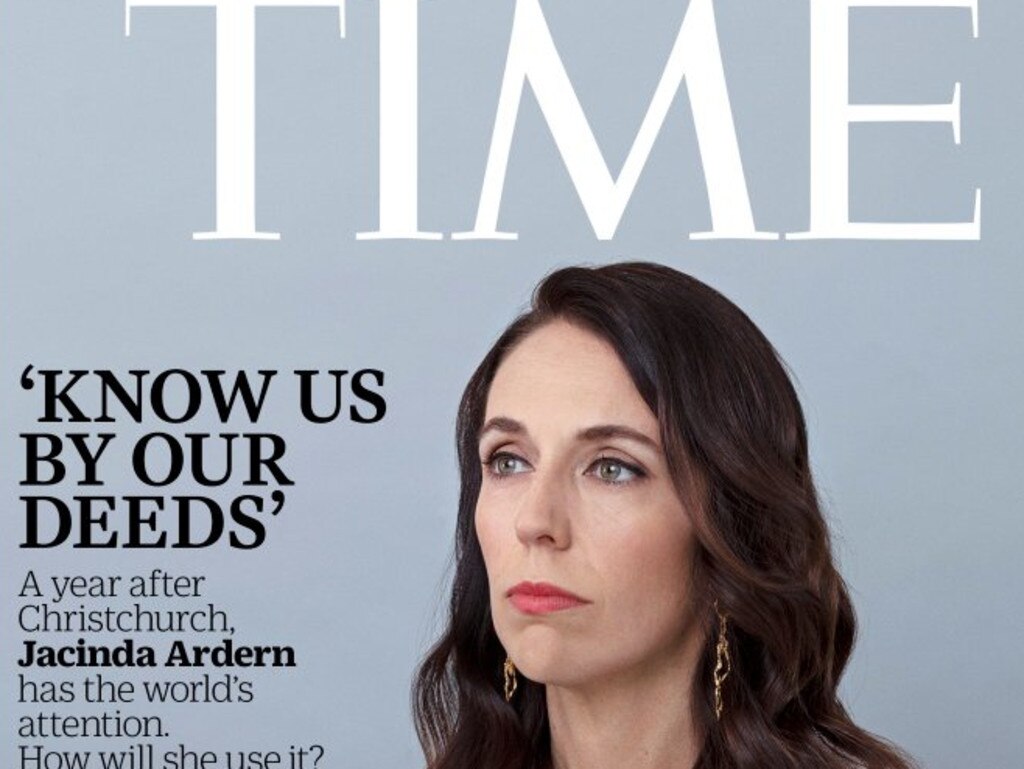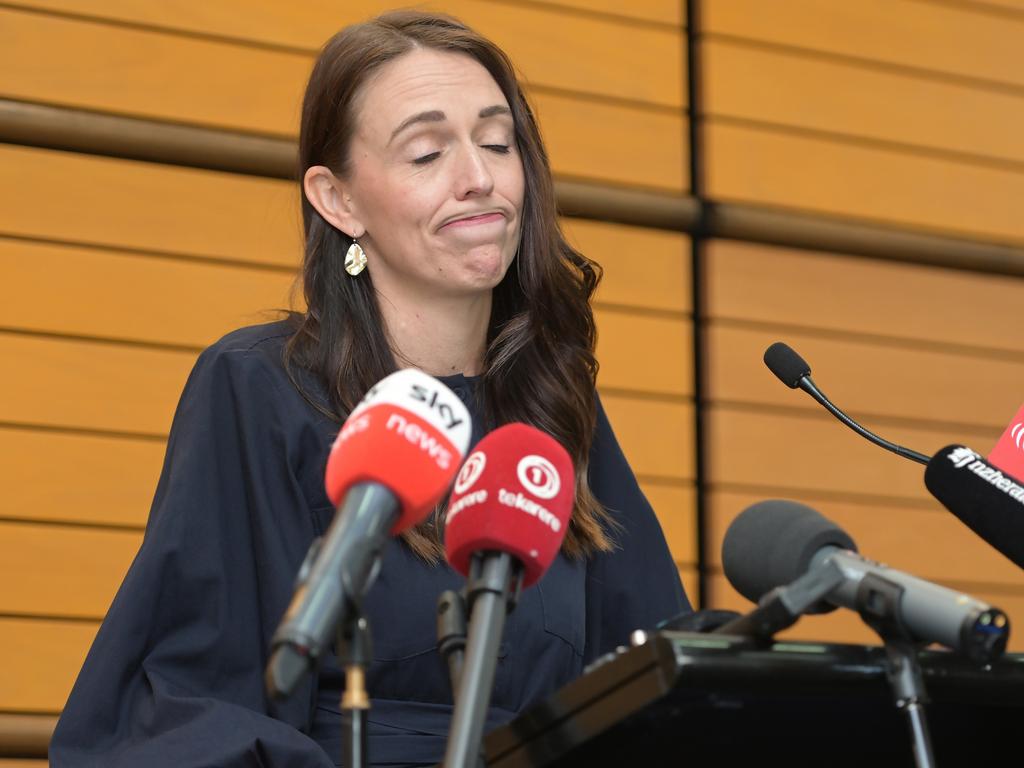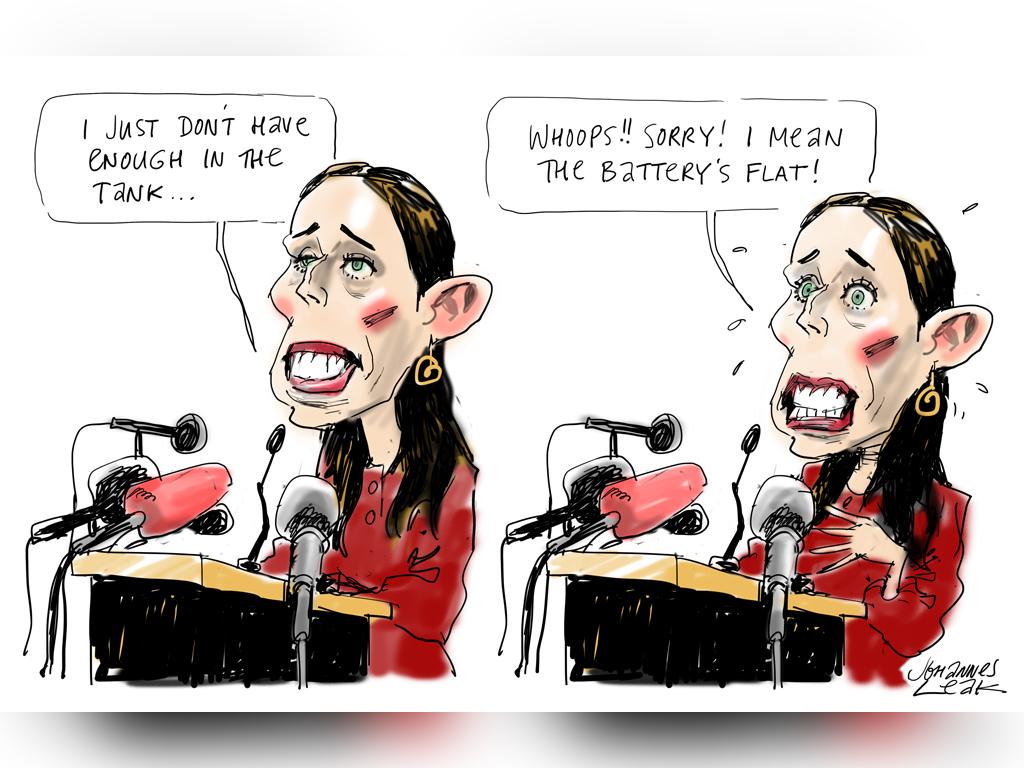‘Icon’ Jacinda Ardern raised the roof — but her legacy is no bed of roses
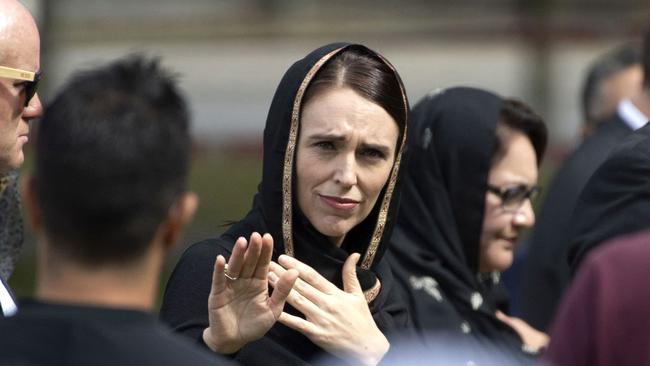
And then, suddenly, she has gone. Well, heading swiftly to the exit that is.
New Zealand Prime Minister Jacinda Ardern’s sudden announcement on Thursday that she will down tools to resign her position by February 7 and leave politics altogether by April was a seismic event in a country used to the odd earthy rumble.
Her exit will almost certainly leave the Labour Party in political crisis. Her departure will be keenly felt by her colleagues and supporters as, like most parties, Labour’s political fortunes are tightly bound to the popularity of its leader.
Once an orderly herd led by Ardern, the horses have now been scattered with no obvious heir apparent to take the reins. Ardern’s exit and the resulting party leadership contest will surely hamper Labour’s election prospects at the October 14 general election.
In announcing her departure, she naturally asserted her belief that her party can win another term without her. But even her supporters would agree this view is highly optimistic and even naive. Emerging opinion in New Zealand suggests her exit signals a concession that the race is all but lost and the political winds are now firmly behind the opposition centre-right National Party led by Christopher Luxon.
Turning back to her legacy – or legacies – one is more complex than the other.
As any leader should, Ardern has been at the vital centre of national events since assuming office in 2017. She explained her decision to step down in the same heartfelt and earnest way for which she is well known and admired.
That she accepts she doesn’t have the reserve of energy that the job demands and wants to spend more time with her young family than the job permits was met by Kiwis, and even her political adversaries, with the understanding that it deserves.
Yet it was a dramatic final episode in a premiership that was marked by drama and crises of various sorts. Among them are the country’s worst mass shooting, a deadly volcanic eruption, the death of a reigning monarch and head of state, and the Covid pandemic that paralysed the nation.

Irrespective of one’s political persuasion, Ardern should be seen as a significant prime minister. Few leaders anywhere have had to shoulder the sort of challenges she has endured in the five years since assuming high office. In doing so, she has proven herself an able crisis manager, with her actions earning wide admiration.
This is not to say, however, that her legacy is entirely a bed of roses. They almost never are for political leaders. It could be said that she, in fact, has multiple legacies and all are mixed in fortune.
Ardern is, in the eyes of some, an iconic figure. One year after becoming prime minister at the young age of 37, she became just the second world leader to give birth while in office – the late Benazir Bhutto of Pakistan being the first. She captured further attention and plaudits by bringing her infant daughter to the floor of the UN general assembly in New York in 2018. Taken together, these moments helped make her a global symbol for modern and achieving women.
Indeed, Ardern is seen beyond New Zealand as an international political rock star. To many, she was a fresh, empathetic, and intelligent riposte to the muscularity and hardened attitudes of Trumpian politics.
Never has a New Zealand leader held the attention of the global community as Ardern has. Anointed with a halo that was rarely found askew, she was seen abroad as a living saint among the left. Witness the joyous reaction from Harvard University’s 2022 graduating class to her commencement address during her trip last year to the US.
She metaphorically raised the roof when she listed her government’s work around gun control, reproductive rights, and climate and green energy policies and other progressive touchstones. It was a tour de force in aspirational politics – the sort she has mastered. But it was also an expression of a particular sense of fealty towards Ardern – Saint Jacinda – from liberal-leaning communities and the political left in countries where conservative power is deeply rooted and often pervasive.
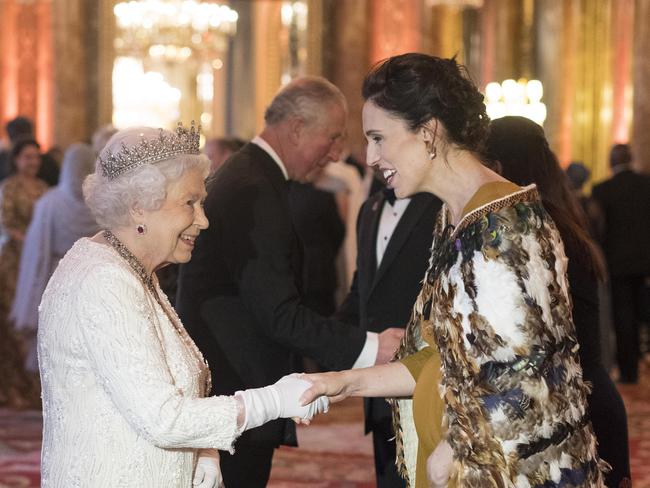
Whether by design or happenstance, she is regarded as one of the most popular (if not the most popular) progressive voices in the global conversation. This is a rare and impressive feat for a leader of a small and tucked-away state. Her cheery and diligent persona usefully embodies a country that has soft power in abundance and is idealised by many people around the world. Many Kiwis loved this about Ardern, and this has been one of the main sources of her popularity with voters.
At home and aboard, Ardern was particularly adept at hitting the high notes of New Zealand’s core liberal democratic ideas, such as supporting critical institutions and upholding human rights and the rule of law.
She is also highly skilled at telling the NZ story to boost the country’s brand, probably more so than any of her predecessors.
Few too are national leaders – anywhere – so at ease in navigating popular culture to advance the national interest. Where many prime ministers and presidents founder and appear wholly unconvincing embracing talk shows or referencing the popular tenor of the times, Ardern did not. In large part due to her age, she never looked out of place nor appeared particularly frivolous on her numerous appearances on American talk shows. This was, quite naturally, part of her allure to generations of voters who admire her pluck, wit, and down home charm.
By putting New Zealand on the map, advancing the national brand, and boosting her appeal, her ability to engage with popular culture was a force multiplier.
The volume and sincerity of tributes from fellow leaders across the globe, Anthony Albanese among them, to the news of her resignation is testament to her outsized international presence, her skill at nurturing diplomatic relationships, and the strength of her personality.
And yet her ability to leverage her global status into actual gains for NZ foreign policy, and the values that uphold it, remain largely unimpressive.
Ardern showed a sure footing on foreign policy and clearly relished her role as her country’s top diplomat. Even so, her popularity didn’t translate into many substantial wins for her country, and her foreign policy impression is hardly a deep or lasting one.
Successfully negotiated trade deals with the UK and EU notwithstanding, her international efforts could be viewed as more superficial than substantive.
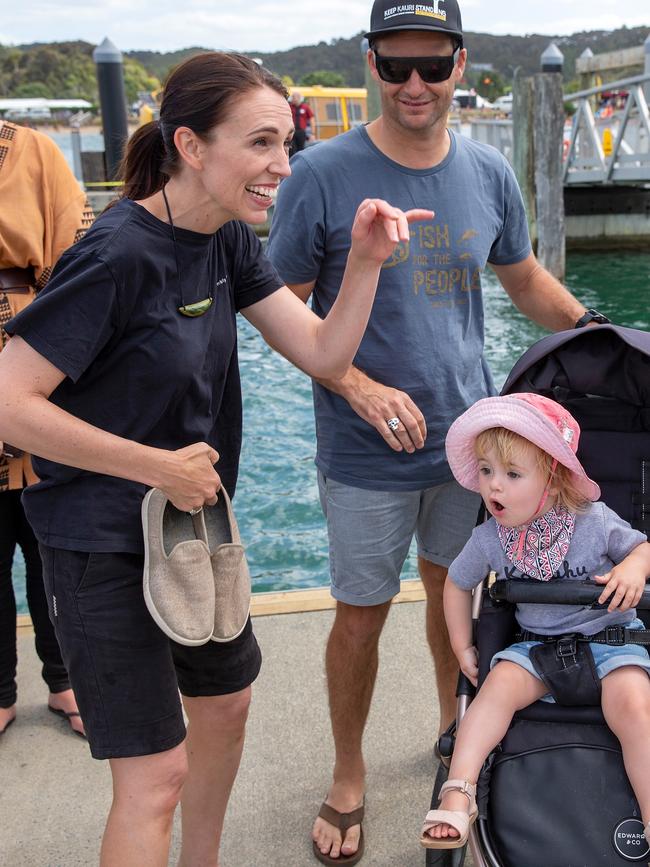
On relations with Australia, despite being ideologically aligned and friendly with Albanese, sources of tension remain around residual issues. Though Albanese has softened his stance on immigration, it is still a vexed issue between the two nations.
Ardern quickly learned that having a personal and political affinity with her Australian counterpart was no guarantee in resolving policy cleavages. With New Zealand-China relations, the dial has not moved much under Ardern. Her government continues to press Beijing on human rights and regional security but is still desperate not to scupper the relationship with NZ’s most important economic partner. It is thus more muted and calibrated in its response to Beijing’s aggressive behaviour than others.
Arguably, Ardern’s most important piece of foreign policy was her visit to the US last year to remind a key trading and security partner that NZ had reopened for business after its self-imposed Covid isolation. It was a visit that possibly underscored all that is strong and weak about her foreign policy. The tour demonstrated her star power and access – particularly in media and pop culture, while President Joe Biden adjusted his agenda to have a White House meeting and photo opportunity. But there were few material wins for her, and the improved access to the US market for Kiwi exporters is every bit as elusive as it has been for decades.
One clear foreign policy success for Ardern, however, was spearheading the creation of the Christchurch Call to Action accord with French President Emmanuel Macron aimed at eliminating terrorist and violent extremist content online. Forged in the wake of the 2019 deadly shooting attack on two Christchurch mosques by a lone Australian terrorist, the event, and Ardern’s response to it, served as a defining act of her premiership.
Probably the essential aspect of Ardern’s legacy overall was her management of historical crises and challenges that struck NZ during her premiership. Such were the severity and duration of the crises that by the time she announced she was going, it felt as if she had been steering the ship for much longer than her nearly six years at the helm.
Ardern’s early health-led response to various Covid outbreaks across the land earned much praise at home and abroad. Her efforts to communicate the problem and the task at hand, and her presence at the podium for daily publicly televised briefings, was a source of great comfort to a confused and worried nation. This, in turn, led to an unusually high level of public compliance in the face of draconian lockdown and quarantine measures. During these early and successful days of pandemic management, trust in government rocketed, and this was in large part due to Ardern. It also meant her approval rating soared well above 60 per cent, an unprecedented height in modern NZ politics.
But as the pandemic continued, public disquiet over the government’s implementation and management of its strict Managed Isolation Quarantine program for Kiwis returning home grew amid calls that it infringed on fundamental human rights of citizens while severely impacting their lives. Opposition to the country’s vaccine mandate also grew in (radical) pockets, and ultimately manifested itself in a violent protest and occupation of the grounds of the NZ parliament. In local scenes foreign to Kiwi eyes, this was a clear low light of Ardern’s premiership, and she faced criticism for not doing more to stop the occupation and subsequent unrest.
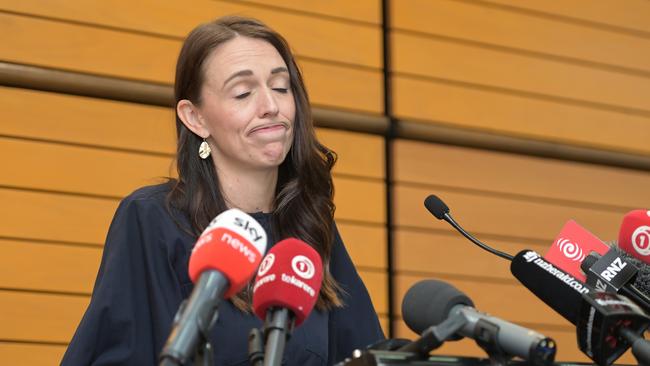
Critics also argued the government’s decision to spend heavily on Covid measures – including payments to affected workers and business – while continuing to fund non-Covid initiatives at existing levels was inflationary and directly contributed to the country’s current cost-of-living crisis.
Ardern’s focus on pandemic governance meant her domestic agenda was mostly put on the backburner. When the air cleared, however, it was far from plain sailing. Her government struggled to communicate and effect several favoured policies and uphold election promises. This included issues of strengthening resource management, fixing the affordable housing problem, refining water governance, and improving the health and criminal justice system. Her flailing domestic agenda has contributed to the public’s slow erosion of faith in Ardern and her party, while embarrassing reversals and broken promises on tax policy shackled her domestic agenda and political credibility.
Critics also point out that under Ardern, promises to tackle domestic greenhouse emissions and position New Zealand as active and aggressive leader on global climate change have fallen well short of expectations.
Overpromising and underdelivering was a constant feature of Ardern’s government, yet she will leave office admired, even beloved, by many New Zealanders.
It is nonetheless premature to eulogise her life in public service. Though it is unlikely that she will pull a Nixonian return to the political sphere, she is young and capable enough to forge a second public career elsewhere. Rumours have swirled for months that she might take up a leadership position in the international civil service, much like her mentor and former Labour prime minister Helen Clark who left NZ politics for the United Nations Development Program.
Arthur Schlesinger Jr, noted American historian and courtier to president John F. Kennedy, once wrote that national leadership should be young, vigorous, intelligent, civilised, and experimental. For all her trials and tribulations during her time in the top job, many in NZ and abroad would readily and fairly attribute those traits to Ardern.
Craig Greaves is a NZ-based writer who spent nearly a decade working for the US State Department advising on NZ foreign policy and NZ politics.

